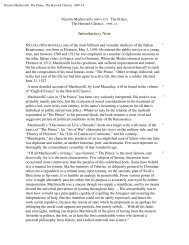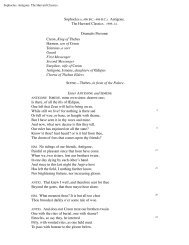Notre Dame de Paris - Bartleby.com
Notre Dame de Paris - Bartleby.com
Notre Dame de Paris - Bartleby.com
You also want an ePaper? Increase the reach of your titles
YUMPU automatically turns print PDFs into web optimized ePapers that Google loves.
“Oh, ’tis a dream!” she murmured, and she felt ru<strong>de</strong> hands bearing her away.<br />
IV. Lasciate Ogni Speranza<br />
IN the Middle Ages, when an edifice was <strong>com</strong>plete there was almost as much of it un<strong>de</strong>r the ground as<br />
over it. Except it were built on piles, like <strong>Notre</strong> <strong>Dame</strong>, a palace, a fortress, a church, had always a<br />
double foundation. In the cathedrals it formed in some sort a second cathedral—subterranean,<br />
low-pitched, dark, mysterious—blind and dumb—un<strong>de</strong>r the aisles of the building above, which were<br />
floo<strong>de</strong>d with light and resonant day and night with the music of the organ or the bells. Sometimes it was<br />
a sepulchre. In the palaces and fortresses it was a prison—or a sepulchre—sometimes both together.<br />
These mighty masses of masonry, of which we have explained elsewhere the formation and growth, had<br />
not mere foundations but more properly speaking roots branching out un<strong>de</strong>rground into chambers,<br />
passages, and stairways, the counterpart of those above. Thus the churches, palaces, and bastilles might<br />
be said to be sunk in the ground up to their middle. The vaults of an edifice formed another edifice, in<br />
which you <strong>de</strong>scen<strong>de</strong>d instead of ascending, the subterranean storeys of which exten<strong>de</strong>d downward<br />
beneath the pile of exterior storeys, like those inverted forests and mountains mirrored in the waters of a<br />
lake beneath the forests and mountains of its shores.<br />
At the Bastille Saint-Antoine, at the Palais <strong>de</strong> Justice, and at the Louvre, these subterranean edifices<br />
were prisons. The storeys of these prisons as they sank into the ground became even narrower and<br />
darker—so many zones presenting, as by a graduated scale, <strong>de</strong>eper and <strong>de</strong>eper sha<strong>de</strong>s of horror. Dante<br />
could find nothing better for the construction of his Inferno. These dungeon funnels usually en<strong>de</strong>d in a<br />
tub-shaped pit, in which Dante placed his Satan and society the criminal con<strong>de</strong>mned to <strong>de</strong>ath. When<br />
once a miserable being was there interred, farewell to light, air, life—ogni speranza—he never issued<br />
forth again but to the gibbet or the stake unless, in<strong>de</strong>ed, he were left to rot there—which human justice<br />
called forgetting. Between mankind and the con<strong>de</strong>mned, weighing upon his head, there was an<br />
accumulated mass of stone and jailers; and the whole prison, the massive fortress, was but one enormous<br />
<strong>com</strong>plicated lock that barred him from the living world.<br />
It was in one of these <strong>de</strong>ep pits, in the oubliettes excavated by Saint-Louis, in the “in pace” of the<br />
Tournelle—doubtless for fear of her escaping—that they had <strong>de</strong>posited Esmeralda, now con<strong>de</strong>mned to<br />
the gibbet, with the colossal Palais <strong>de</strong> Justice over her head—poor fly, that could not have moved the<br />
smallest of its stones! Truly, Provi<strong>de</strong>nce and social law alike had been too lavish; such a profusion of<br />
misery and torture was not necessary to crush so fragile a creature.<br />
She lay there, swallowed up by the darkness, entombed, walled, lost to the world. Any one seeing her in<br />
that state, after beholding her laughing and dancing in the sunshine, would have shud<strong>de</strong>red. Cold as<br />
night, cold as <strong>de</strong>ath, no breath of air to stir her locks, no human sound to reach her ear, no ray of light<br />
within her eye—broken, weighed down by chains, crouching besi<strong>de</strong> a pitcher and a loaf of bread, on a<br />
heap of straw, in the pool of water formed by the oozings of the dungeon walls—motionless, almost<br />
breathless, she was even past suffering. Phœbus, the sun, noonday, the free air, the streets of <strong>Paris</strong>,<br />
dancing and applause, her ten<strong>de</strong>r love passages with the officer—then the priest, the old hag, the dagger,<br />
blood, torture, the gibbet—all this passed in turn before her mind, now as a gol<strong>de</strong>n vision of <strong>de</strong>light, now<br />
as a hi<strong>de</strong>ous nightmare; but her apprehension of it all was now merely that of a vaguely horrible<br />
struggle in the darkness, or of distant music still playing above ground but no longer audible at the <strong>de</strong>pth<br />
to which the unhappy girl had fallen.










